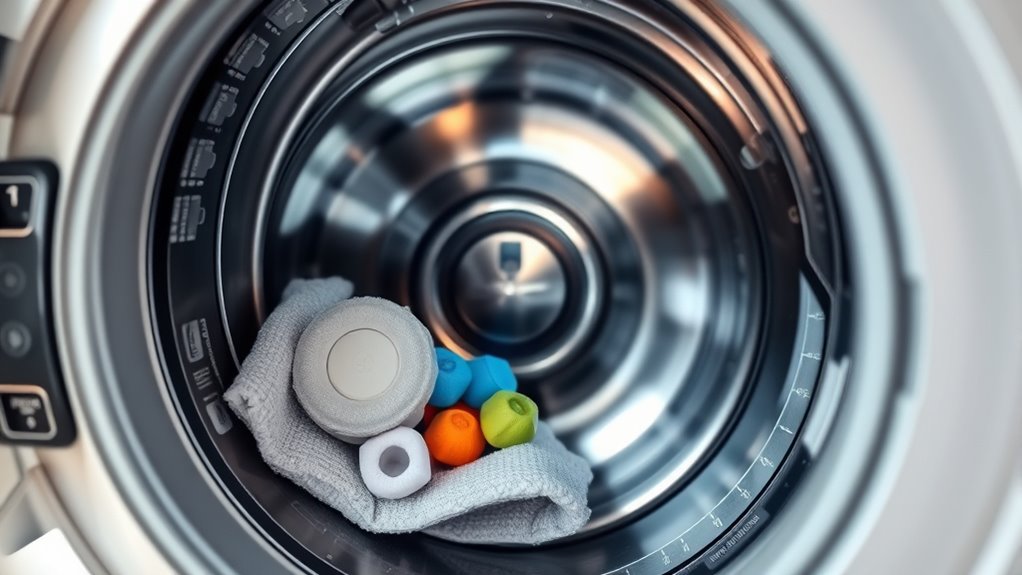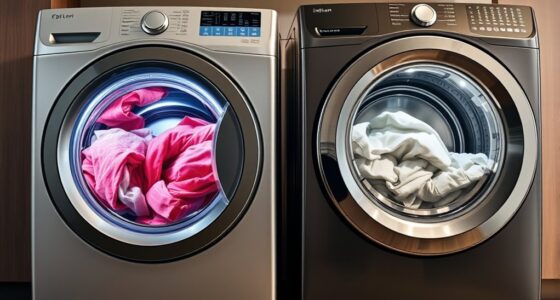Cleaning your washing machine regularly is a must to keep it smelling fresh, work efficiently, and last longer. It helps prevent odor buildup, mold, and mildew that can develop from detergent residues and trapped moisture. By cleaning the dispenser, wiping door seals, and running hot cycles, you reduce dirt and bacteria. Staying on top of maintenance ensures your laundry stays spotless and your machine remains in top shape. Keep exploring to discover simple tips for a squeaky-clean washer.
Key Takeaways
- Regular cleaning prevents odors, mold, and mildew buildup, ensuring a hygienic washing environment.
- It removes detergent residues that can cause clogs, reduce machine efficiency, and damage the appliance.
- Cleaning maintains optimal performance, extends the lifespan of your washing machine, and promotes effective cleaning.
- Proper maintenance of dispenser drawers and door seals helps avoid mold growth and keeps laundry fresh.
- A consistent cleaning routine preserves the machine’s functionality, prevents unpleasant smells, and ensures fresh-smelling laundry.

Keeping your washing machine clean is essential to guarantee it works efficiently and prevents odors. Over time, detergent buildup can accumulate inside your machine, especially in areas like the dispenser drawer, door seals, and drum. This residue not only hampers the machine’s cleaning performance but also creates a breeding ground for mold and mildew. Regularly cleaning your washing machine helps remove these deposits, ensuring that your laundry comes out fresh and spotless each time. Plus, it markedly reduces the chances of unpleasant smells emanating from your appliance.
Regularly cleaning your washing machine prevents odors and maintains optimal performance.
Detergent buildup is often overlooked, but it’s a common culprit behind lingering odors and mold growth. When you use too much detergent or don’t run regular cleaning cycles, soap residue can cling to internal parts. Over time, this sticky film traps dirt, bacteria, and moisture, promoting mold formation. To prevent this, it’s important to use the right amount of detergent and to clean your machine periodically. Running a hot wash cycle with a specialized washing machine cleaner or a mixture of vinegar and baking soda helps dissolve these deposits and flush out hidden grime, keeping your machine fresh and hygienic.
Mold prevention is another vital reason to keep your washing machine clean. Mold thrives in damp, dark environments, which are common inside washing machines, especially if they aren’t dried out after each use. The rubber door seals are notorious for trapping water and debris, creating the perfect environment for mold spores to settle and grow. To combat this, wipe down the seals regularly and leave the door slightly open after use to promote air circulation. Using a cleaning solution designed for mold prevention during your routine maintenance can appreciably reduce the risk of mold developing, safeguarding both your machine and your laundry.
In addition to cleaning the interior, don’t forget to maintain the detergent dispenser. Residues often accumulate there, and if left unchecked, they can cause clogs and promote mold growth. Remove and rinse the dispenser drawer periodically, ensuring all soap and fabric softener residues are thoroughly washed away. This simple step prevents buildup and keeps your machine functioning smoothly. Regular maintenance, including cleaning routines, helps preserve the longevity and performance of your washing machine.
Frequently Asked Questions
How Often Should I Clean My Washing Machine?
You should clean your washing machine every one to three months to prevent detergent buildup and mold growth. Regular cleaning helps eliminate residue that can cause odors and damage your machine over time. If you notice a musty smell or see soap scum, it’s time to give it a thorough clean. Staying consistent guarantees your laundry stays fresh, your machine runs efficiently, and mold prevention remains effective.
Can I Use Vinegar or Bleach for Cleaning?
You can use vinegar or bleach to clean your washing machine, but be aware of the benefits and risks. Vinegar benefits include natural deodorizing and dissolving residue, making it a safe choice for regular cleanings. However, bleach risks involve potential damage to rubber parts and possible health hazards if not used properly. Always follow manufacturer instructions, use in moderation, and guarantee proper ventilation to keep your washer clean and safe.
What Are Signs My Machine Needs a Deep Clean?
Think your washing machine’s just fine? Think again. If you notice a musty odor, mold growth around the door seal, or detergent buildup on clothes, it’s crying out for help. Sluggish cycles, lingering soap residue, or a strange smell are clear signs. Your machine’s hiding dirt and mold that need a deep clean—ignore it, and you risk ruining your laundry days. Time to give it a thorough scrub!
Does Cleaning Improve Washing Machine Efficiency?
Cleaning your washing machine definitely improves its efficiency. It removes detergent buildup that can clog components and cause longer cycles or poor cleaning. Plus, regular cleaning helps prevent mold, which thrives in damp, dirty areas. When you keep your machine clean, it runs smoother, uses less energy, and lasts longer. So, yes, regular cleaning directly boosts your washing machine’s performance and helps maintain a fresh, odor-free laundry environment.
Are There Specific Cleaning Products Recommended?
When it comes to cleaning your washing machine, specific products can make a big difference. Natural cleaning options like vinegar or baking soda work well, but enzyme cleaners are especially effective at breaking down residue and odors. You should select gentle, eco-friendly products to keep your machine running smoothly. Regular use of enzyme cleaners ensures your washer stays fresh and efficient, preventing buildup and extending its lifespan.
Conclusion
If you ignore cleaning your washing machine, it’s like inviting a never-ending parade of mold monsters, stinky socks, and bacteria armies into your home! Your clothes will come out dirtier than when they went in, and your laundry days will turn into nightmare battles. But if you stay on top of cleaning, you’ll keep those monstrous messes at bay, making your laundry room a fresh, sparkling fortress of cleanliness. Don’t let your machine become the villain—clean it today!









